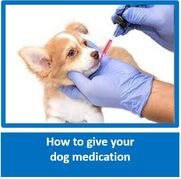|
GENRIC PET INSURANCE - www.genricpet.co.za
Having #petinsurance is a lot like health insurance for people. It protects your finances from the unknowns, ensures access to quality care and treatment, and from ever having to make an unthinkable choice due to financial constraints. Read about some of the recent pet insurance claims paid by #GENRICPet that demonstrates how pet insurance is an invaluable financial tool for pet owners to guard against unexpected #veterinary costs. |
How Do Dogs Get Worms?
This article from the University of Georgia
http://vet.uga.edu/dogdocs/animaldoc/animaldoc_dogw.php
This article from the University of Georgia
http://vet.uga.edu/dogdocs/animaldoc/animaldoc_dogw.php
(Upon reading another post on FBook yesterday that dogs 'only' get worms if fed a raw diet (common Myth) we have sourced an article from the University of Georgia, which explains how dogs actually get worms and the various types of worms they can be infected by.

How a dog gets infected by worms depends on the kind of worms the dog has. There are a lot of different kinds of worms that live in dogs. All of these kinds of worms are called parasites because they feed off the dog instead of living on their own. These are not worms like earthworms; parasite worms have to get inside a dog to reproduce.
The most common ones in dogs are roundworms, hookworms, whipworms, tapeworms, and heartworms. Roundworms and hookworms are found a lot in puppies and sometimes in adult dogs. Whipworms, tapeworms, and heartworms are seen more in older dogs.
Show Me the Worms!
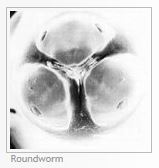
Roundworms
Roundworms, describes a whole bunch of different worm parasites. The most common dog roundworm is Toxocara canis. Humans have a different roundworm, as do cats, horses, pigs, and other animals.
Dogs get roundworms either from eating worm eggs off the ground or because the mother dog was infected and passed the worms to her puppies during her pregnancy.
Adult roundworms have a funny face, with three big lips surrounding their mouth. They feed on partially digested food in the dogs intestine.
Roundworms, describes a whole bunch of different worm parasites. The most common dog roundworm is Toxocara canis. Humans have a different roundworm, as do cats, horses, pigs, and other animals.
Dogs get roundworms either from eating worm eggs off the ground or because the mother dog was infected and passed the worms to her puppies during her pregnancy.
Adult roundworms have a funny face, with three big lips surrounding their mouth. They feed on partially digested food in the dogs intestine.
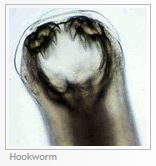
What are hookworms?
Hookworms are smaller than roundworms. They are called hookworms because they feed by hooking onto the wall of the intestine.
Hookworms have pretty sharp teeth and cause the dog's intestine to bleed. Since hookworms eat blood, they like this situation, but too many of them can be very bad for the dog.
Dogs can get hookworms from the ground where other dogs have passed eggs before, or from the milk of their mother if she was infected.
Hookworms are smaller than roundworms. They are called hookworms because they feed by hooking onto the wall of the intestine.
Hookworms have pretty sharp teeth and cause the dog's intestine to bleed. Since hookworms eat blood, they like this situation, but too many of them can be very bad for the dog.
Dogs can get hookworms from the ground where other dogs have passed eggs before, or from the milk of their mother if she was infected.

What are whipworms?
Whipworms also make the dog's intestine bleed because they bury their long necks into the intestine wall when they feed.
They are called whipworms because their long neck next to their short fat body looks like a whip and a whip handle.
Dogs usually get whipworms from eating eggs that other dogs have shed.
Whipworms also make the dog's intestine bleed because they bury their long necks into the intestine wall when they feed.
They are called whipworms because their long neck next to their short fat body looks like a whip and a whip handle.
Dogs usually get whipworms from eating eggs that other dogs have shed.
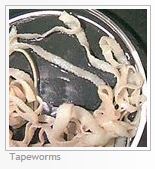
What are tapeworms?
Tapeworms also live in the dog's intestine. They are called tapeworms because of their long, flat, ribbon tape appearance.
Dogs usually get tapeworms when they eat a flea that ate a tapeworm egg. There is another kind of tapeworm that dogs can get when they eat a rabbit that ate a tapeworm egg.
Tapeworms don't have mouths. They feed by absorbing food across their skin. But they hold onto the wall of the intestine with hooks and suckers on their head.
Tapeworms also live in the dog's intestine. They are called tapeworms because of their long, flat, ribbon tape appearance.
Dogs usually get tapeworms when they eat a flea that ate a tapeworm egg. There is another kind of tapeworm that dogs can get when they eat a rabbit that ate a tapeworm egg.
Tapeworms don't have mouths. They feed by absorbing food across their skin. But they hold onto the wall of the intestine with hooks and suckers on their head.
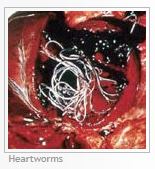
What are heartworms?
Heartworms are parasites that live in the blood vessels and heart of dogs. Sometimes cats are infected with heartworms too.
Because heartworms live inside the heart, too many of them can cause the dog's heart not to work very well and the dog can get sick. In small dogs and cats even a few worms can cause a big problem.
Dogs get heartworms when an infected mosquito bites them. The mosquito got infected by biting another dog that already had heartworms.
Heartworms are parasites that live in the blood vessels and heart of dogs. Sometimes cats are infected with heartworms too.
Because heartworms live inside the heart, too many of them can cause the dog's heart not to work very well and the dog can get sick. In small dogs and cats even a few worms can cause a big problem.
Dogs get heartworms when an infected mosquito bites them. The mosquito got infected by biting another dog that already had heartworms.
How Do I Find Out if My Dog Has Worms?
Your veterinarian can tell you if your dog has worms. The doctor will check a fecal sample from your dog to see if it has any intestinal worms and a blood sample to see if it has any heartworms.
Most veterinarians recommend checking once a year to make sure your dog is free of worms. If your dog does have worms, the doctor can give your dog medicine to get rid of them.
Can I Get Worms From My Dog?
Most parasitic worms are very species-specific. This means that worms from dogs don't get into people, and worms from people don't get into dogs. Very rarely some dog worms will try to infect people and can make them sick, but the worms come from places where lots of dog eggs have been shed, like parks and playgrounds, and not necessarily from a single pet.
Your veterinarian can tell you if your dog has worms. The doctor will check a fecal sample from your dog to see if it has any intestinal worms and a blood sample to see if it has any heartworms.
Most veterinarians recommend checking once a year to make sure your dog is free of worms. If your dog does have worms, the doctor can give your dog medicine to get rid of them.
Can I Get Worms From My Dog?
Most parasitic worms are very species-specific. This means that worms from dogs don't get into people, and worms from people don't get into dogs. Very rarely some dog worms will try to infect people and can make them sick, but the worms come from places where lots of dog eggs have been shed, like parks and playgrounds, and not necessarily from a single pet.





